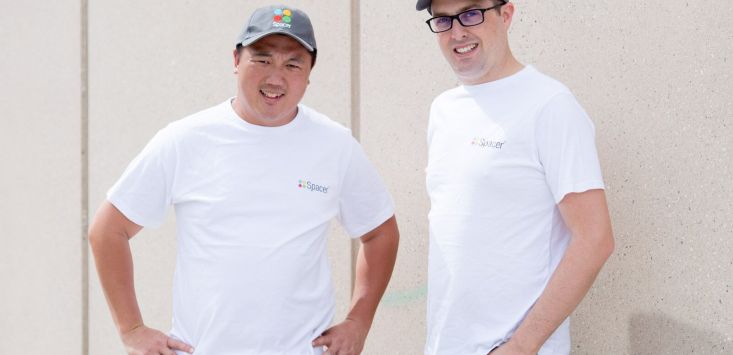
Spacer co-founders Roland Tam and Mike Rosenbaum. Source: Supplied.
Storage marketplace Spacer has raised $2.7 million to fund an acquisition of rival startup Parkhound and consolidate its parking, storage and warehouse space offerings in the US market.
Spacer was launched in Sydney in October 2015 and allows its users to monetise their unused storage, parking or warehouse spaces, in turn offering other users places to park their car or store their goods.
The platform was developed after co-founder Mike Rosenbaum travelled to Silicon Valley and saw the popularity of similar space-sharing storage offerings in the states.
Rosenbaum is no stranger to spotting a potential startup idea, having co-founded DealsDirect and Sydney-based sharing economy accelerator The Sharing Hub. Since then, Spacer has expanded its offerings Australia-wide, and now has a presence in New York, San Francisco and Boston after launching in the US market six months ago.
Spacer has now raised $2.7 million to fund the acquisition of rival parking marketplace Parkhound for an undisclosed sum, and its co-founder Roland Tam says these funds will also be used to “build up reserves for investment in marketing and people” ahead of the startup’s plan to consolidate its foothold in the US market.
Melbourne-based Parkhound was founded in 2013 and appeared on Shark Tank last year, turning down a $400,000 offer in exchange for 30% equity in its shared parking marketplace from sharks Naomi Simson, Janine Allis and Glen Richards.
At the time Parkhound received a grilling from shark Steve Baxter, who called the startup an “instant fail” for not having a tech-lead or founder with equity in their core team, but despite Baxter’s reservations, the startup has grown to a community of 55,000 users and 10,000 parking locations across Australia.
This year alone, Parkhound says its users have booked more than 5 million hours of parking through the platform, and its suppliers have made more than $5 million in parking revenue.
Spacer’s acquisition of Parkhound now makes it the only parking, storage and warehouse space marketplace in Australia, Tam says, with the startup now boasting a combined Parkhound-Spacer user base of 100,000 members and more than 20,000 storage, warehouse and parking space suppliers.
While Tam says Spacer and Parkhound will operate side by side autonomously for the near future, retaining both employee bases, eventually Parkhound’s parking offerings will be absorbed under the Spacer umbrella. This umbrella will encompass bookings and leasings in three core fields: parking, storage, and warehouse space.
“Going forward we are going to … create Spacer as the number one marketplace for those three verticals,” Tam tells StartupSmart.
This acquisition comes as Spacer is experiencing 20% month-on-month revenue growth and more than 25% month-on-month growth in locations, according to Tam, who has market domination in his sights.
“What you find with marketplaces is typically globally, it’s a winner takes all proposition where you get someone like an Uber who just dominates the whole marketplace, and it’s very difficult to disrupt that once it’s been built,” he says.
“That is our mission.”
Parkhound is Spacer’s second acquisition, after the startup acquired Silicon-Valley based peer-to-peer space sharing startup Roost in March this year, re-branding the company to become Spacer’s US operations.
The startup will also use its new funds to grow its Vietnam-based tech team, adding to a global team of 16 spread across Sydney, Silicon Valley, Vietnam and Manila.
This funding brings the total amount Spacer has raised to $5 million from angel investors and “high net worth individuals” Tam says, declining to name the investors involved in this fundraising round.
“Focus purely on the important metrics”
Before joining Spacer, Tam came from a background in corporate mergers and acquisitions (M&A), and says acquisitions on a small startup scale can sometimes be harder than multimillion-dollar takeovers.
“Coming from an M&A background I was doing deals around the $100 million mark,” he says.
“When you’re doing deals with a single million-dollar mark, the workload doesn’t change; it actually becomes very costly to try and do M&A at that scale,” he says.
Tam says acquisitions of early-stage companies that may not have clearly defined growth or scaling metrics can “get very messy”, advising startups to pick some core metrics and hone in on these.
“Focus purely on the important metrics and the synergies [between you and the potential acquisition] and try not to get too bogged down in the legal elements of it,” Tam advises.
While Tam admits acquiring an early-stage startup can get messy, he says Parkhound was “a natural fit” for Spacer to acquire, and the intellectual property, customer base and locations acquired as a result will “really turbocharge” the business.
“On the evolutionary curve they [Parkhound] were a little bit ahead of us; for us and our ambitions it was a natural turbocharge to takes us to the next level, so it made a lot of sense,” he says.
Follow StartupSmart on Facebook, Twitter, LinkedIn and iTunes.


COMMENTS
SmartCompany is committed to hosting lively discussions. Help us keep the conversation useful, interesting and welcoming. We aim to publish comments quickly in the interest of promoting robust conversation, but we’re a small team and we deploy filters to protect against legal risk. Occasionally your comment may be held up while it is being reviewed, but we’re working as fast as we can to keep the conversation rolling.
The SmartCompany comment section is members-only content. Please subscribe to leave a comment.
The SmartCompany comment section is members-only content. Please login to leave a comment.